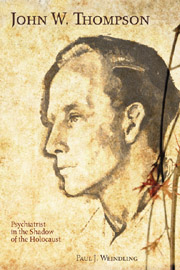Book contents
- Frontmatter
- Contents
- List of Illustrations
- Acknowledgments
- List of Abbreviations
- Part One Into the Dark
- Part Two Redemption
- Part Three Aftermath
- 13 UNESCO: At the Conscience of the World
- 14 The Eau Vive Affair
- 15 Sebastian
- 16 Matthias
- 17 Child Guide
- 18 New York: “St. John the Psychiatrist”
- 19 Hallucinations
- 20 “Dying We Live”
- Appendix John Thompson's Writings
- Notes
- Sources
- Index
15 - Sebastian
from Part Three - Aftermath
Published online by Cambridge University Press: 12 September 2012
- Frontmatter
- Contents
- List of Illustrations
- Acknowledgments
- List of Abbreviations
- Part One Into the Dark
- Part Two Redemption
- Part Three Aftermath
- 13 UNESCO: At the Conscience of the World
- 14 The Eau Vive Affair
- 15 Sebastian
- 16 Matthias
- 17 Child Guide
- 18 New York: “St. John the Psychiatrist”
- 19 Hallucinations
- 20 “Dying We Live”
- Appendix John Thompson's Writings
- Notes
- Sources
- Index
Summary
Klaus
“Berlin Boys' Arrest”: On December 18, 1946, the Daily Telegraph ran a story on the arrest of five boys (out of a gang of nineteen) for stealing cigarettes and sweets. Postwar Berlin attracted street gangs who lived off petty crime, the sale of sexual favors, and black market goods. There were thirteen million orphans in postwar Europe. At the time of the currency reform in 1948 an estimated forty thousand homeless juvenile delinquents without papers lived in the British Zone alone. “Save Europe Now” was the slogan for an effort to cope with “the masses of unorganised and endangered youth,” an imperiled generation of starving runaways and street children. A tide of compassion for the misery of the expelled German children ran high. Thompson confronted a fatherless generation prone to aggression, destruction, and anxiety.
Thompson became the mentor to a series of disoriented adolescents: Klaus and his brother Wolfgang, Matthias Leber, Vladimir Slivitzky, and Renée Goossens. Klaus Littmann was born on January 22, 1931, and his brother Wolfgang on April 11, 1935. The brothers grew up in the thriving Baltic port city of Stettin in Pomerania, a city that became the Polish Szczecin at the close of the war. They lived in the Wilhelm-Busch-Strasse. Busch's comic-strip bad boys, Max and Moritz, were humorous role models for their exploits. Their father, Kurt, born in 1902, worked in banking as a Revisor, auditing accounts in banks and funds throughout the region.
- Type
- Chapter
- Information
- John W. ThompsonPsychiatrist in the Shadow of the Holocaust, pp. 242 - 255Publisher: Boydell & BrewerPrint publication year: 2010

